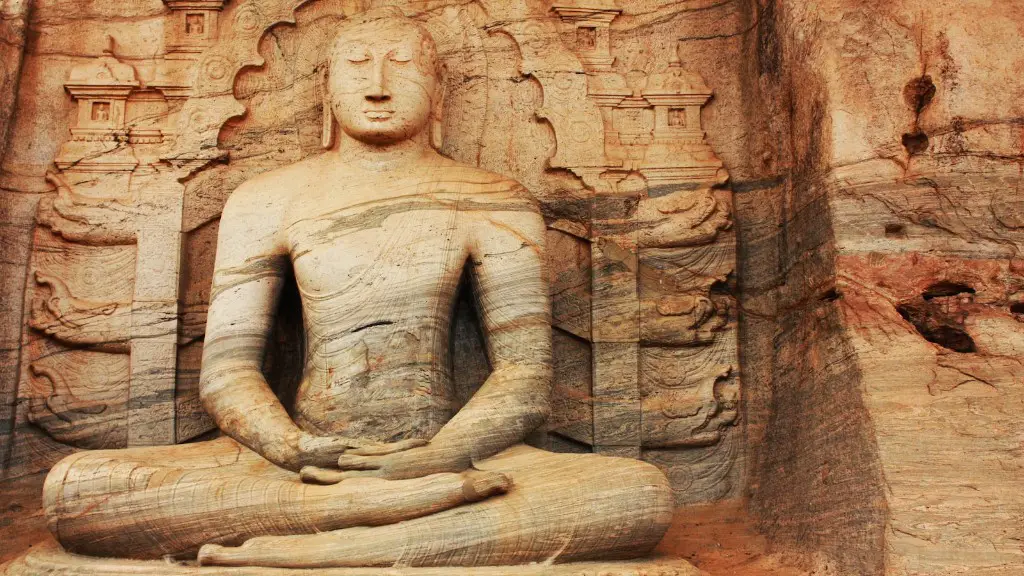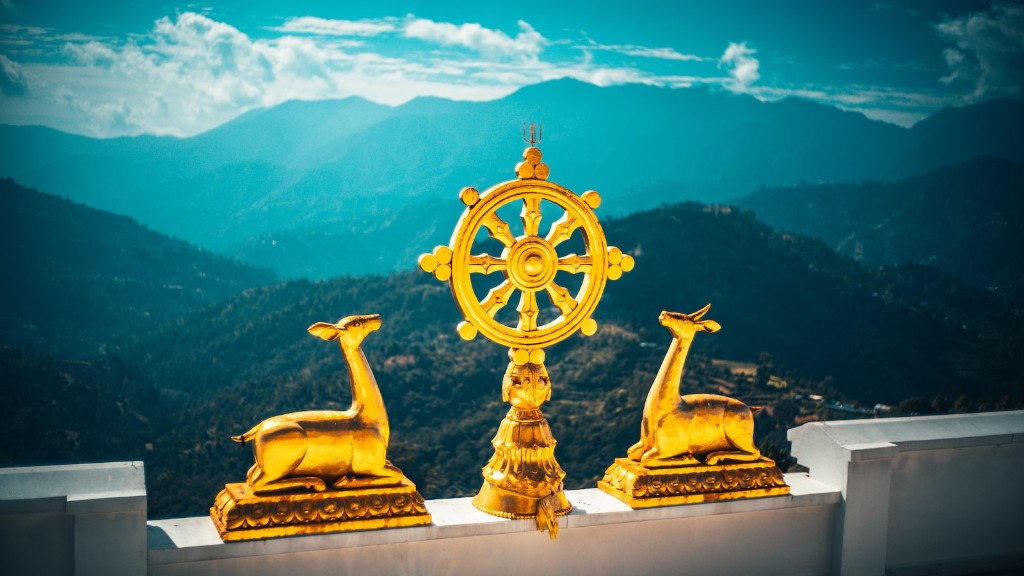Hindutva and Hinduism are often used interchangeably, as many people believe that the two terms refer to one and the same thing – the religion of the Hindu people. However, there is a big difference between Hindutva and Hinduism – one which is important to understand in order to fully grasp the doctrines and principles of this ancient way of life.
Hindutva is commonly understood as a cultural and political ideology which aims to uphold the values and beliefs of traditional Hindu culture. It is often associated with the Bharatiya Janata Party (BJP), a political party in India, who have adopted Hindutva as a strategy to remain in power, even though many of their policies and ideologies contradict traditional Hindu beliefs.
On the other hand, Hinduism is an ancient religion which encompasses a wide variety of beliefs and practices. It is the third largest faith in the world, with approximately one billion followers. Unlike Hindutva, Hinduism is not centered around any single set of beliefs or ideology. Instead, it is based on spiritual principles and teachings which focus on understanding the interconnectedness of all life, and leading a life of balance, harmony and peace.
Main Principles
The main principle at the core of Hindutva is the belief that Hindu culture and traditions should be protected, cherished and promoted. The emphasis is on preserving the integrity and distinctiveness of traditional Hindu culture, rather than on embracing and understanding the beliefs of other religions and cultures.
Hinduism, on the other hand, is based on the spiritual teachings of ancient Hindu holy texts such as the Upanishads, the Bhagavad Gita, and the Vedas. These teachings emphasize the importance of self-transformation and spiritual growth. Hinduism advocates living a life of dharma (righteousness), karma (action) and moksha (liberation). The aim is to ultimately gain knowledge and understanding of the true nature of reality.
Hindutva also encourages rituals, customs and traditions as a means of furthering the cause of the Hindu people, while Hinduism does not lay much emphasis on such outward displays of piety and devotion. Instead, it advises its followers to focus on personal transformation and introspection instead of blind adherence to rituals.
Political Implications
The ideologies of Hindutva have been used by the BJP as a tool to further their political agenda and consolidate their power. The party has often used Hindutva to incite communal hatred, create divisions in society, and stifle dissent against their policies. This has led to a great deal of conflict and violence in India, as Hindutva has become increasingly focused on polarization rather than inclusion.
Hinduism, on the other hand, has traditionally been non-confrontational and accepting of other faiths and beliefs. It advocates tolerance, compassion, understanding and co-existence. In contrast to Hindutva, Hinduism promotes the idea of Vasudhaiva Kutumbakam – which translates to “the world is one family”.
The two ideological schools are thus diametrically opposed on several issues, such as the treatment of minorities, the importance of religious traditions and the role of the state in encouraging religious piety. Hindutva is a largely political ideology which seeks to promote the interests of certain groups, while Hinduism is a spiritual path which advocates openness, diversity and understanding.
Freedom of Choice
It is important to recognize the fundamental difference between Hindutva and Hinduism in order to understand the full scope of both philosophies. It is up to individuals to decide which path they wish to follow. Some may choose to follow the teachings of Hindutva, while others may prefer to embrace the spiritual path of Hinduism or even choose to follow a different faith or spiritual practice. The important thing is to recognize and uphold the right of individuals to choose the religious or spiritual path that works for them personally.
Furthermore, it is crucial to remember that Hindutva is a political ideology and that Hinduism is a spiritual doctrine. One should be careful not to confuse the two, as many people do, as this can lead to misunderstanding and even conflict. Both ideologies are important, but it is up to individuals to decide which path is right for them.
Hindutva In Other Countries
Since the rise of Hindutva, it has slowly spread to other parts of the world, especially in countries like the United States, Australia and the United Kingdom. In countries outside India, Hindutva is often used to promote a more conservative version of Hinduism, and to encourage the spread of Hindu culture and beliefs. Today, Hindutva is often used to represent a certain brand of Hinduism, which is both political and religious in nature.
At the same time, Hinduism has also spread to many parts of the world and is now one of the most popular religions globally. Hinduism is often celebrated for its diversity and inclusiveness, and for its ability to adapt to different local cultures and traditions. It is a faith which encourages openness and understanding, rather than exclusivity and division.
Thus, while Hindutva and Hinduism are often thought of as being the same thing, there are major differences between the two. Hindutva is a political and cultural ideology, while Hinduism is a spiritual doctrine. It is up to individuals to decide which path they wish to follow, and to make sure that they are not confusing the two.
Perception Of Hinduism
In recent years, there has been a growing misconception that Hinduism is a fundamentalist religion and that it is only practiced by a narrow and rigid set of people. This misperception is largely due to the spread of Hindutva and its use by certain groups to control and manipulate Hinduism for their own selfish ends.
The reality, however, is that Hinduism is a religion that encompasses a wide variety of beliefs and practices. It is a religion that embraces pluralism and is open to new ideas and interpretations. This plurality is one of the greatest strengths of Hinduism, and its inclusive nature encourages people from all backgrounds and points of view to share their ideas and beliefs.
Furthermore, Hinduism is a highly flexible and diverse religion, which allows its followers to adapt religious tenets and practices to meet their personal needs and preferences. This makes it a very accepting religion, and one that has stood the test of time for centuries.
Understanding Hindutva And Hinduism
Ultimately, understanding the differences between Hindutva and Hinduism is essential in order to fully appreciate both ideologies. Hindutva is a largely political ideology which has been used to promote division, while Hinduism is an ancient spiritual path which emphasizes pluralism and inclusiveness. Thus, it is important to recognize and uphold the right of individuals to embrace either path, or to follow a different faith altogether.
In addition, it is important to recognize that Hinduism is a religion that can be interpreted in many different ways. It is a powerful and flexible faith that has been embraced by people of diverse backgrounds and cultures. As such, it is important to remember that Hinduism is an ever-evolving religion that encourages personal freedom and spiritual growth.
Role Of Hindutva And Hinduism In Society
Hindutva and Hinduism have both played a vital role in Indian society, as they have enabled a variety of religious, cultural and political groups to find a common ground and to work towards a shared goal. The principles of Hindutva have allowed for the preservation of Hindu culture and traditions, while Hinduism’s spiritual teachings have provided individuals with a powerful path to personal growth and transformation.
Furthermore, both ideologies have allowed for the emergence of a strong and vibrant Indian democracy. Hindutva has enabled the creation of a strong political identity, while Hinduism has encouraged tolerance, understanding, and respect for all religions and beliefs.
At the same time, it is important to remember that both Hindutva and Hinduism are distinct, with different goals and ideologies. As such, it is important to recognize and uphold the right of individuals to choose which path they wish to follow. In doing so, we can create a society in which individuals are respected and where all forms of religious expression are embraced and celebrated.


